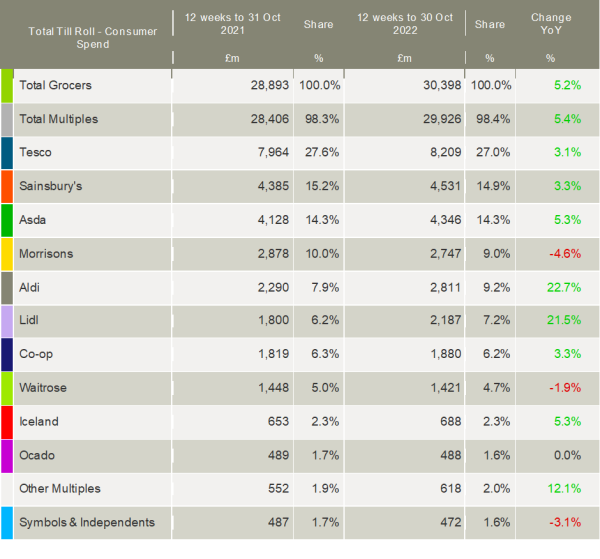Latest figures from Kantar show take-home grocery sales rose by 5.2% in the 12 weeks to 30 October 2022, with value-orientated supermarkets seeing the strongest growth. The figure was driven by grocery price inflation which hit 14.7% – the highest level since Kantar began tracking prices in this way in 2008.
Fraser McKevitt, the research group’s head of retail and consumer insight, commented: “Yet again, we have a new record high figure for grocery price inflation and it’s too early right now to call the top.
“Consumers face a £682 jump in their annual grocery bill if they continue to buy the same items and just over a quarter of all households (27%) now say they’re struggling financially, which is double the proportion we recorded last November. Nine in ten of this group say higher food and drink prices are a major concern, second only to energy bills, so it’s clear just how much grocery inflation is hitting people’s wallets and adding to their domestic worries.”
Own-label sales continued to rise, up by 10.3% over the latest four weeks as shoppers look to manage their grocery budgets. The branded goods market grew by just 0.4%. McKevitt said: “Food and drink spending is generally non-discretionary so it’s not easy for shoppers to cut back the amount they buy. Many are looking to reduce costs in other ways and the big shift to own label is still accelerating.
“While some of the rise will be down to price inflation, we can clearly see the trend in sales of the very cheapest value own label ranges, which are up by a whopping 42%. These items currently represent just under 3% of the market, although retailers have been adding new products in recent months, so it will be interesting to see if this continues.”
Meanwhile, Kantar noted that fewer people were stocking up for Christmas in October, instead preferring to wait until later in the year. This time last year two million consumers had already bought their festive Christmas pudding. “We’ve seen 32% fewer shoppers doing that this time around, suggesting people are not trying to spread the cost of their purchasing – at least not in October,” said McKevitt.
He highlighted that the men’s football World Cup kicking off on 20 November was likely to impact the usual Christmas shopping trends, with beer and snacks set to boost sales ahead of evening games.
Aldi was the fastest-growing retailer over the 12-week period, increasing its sales by 22.7% to hold a 9.2% market share. Lidl saw its sales jump by 21.5%, taking its market share to a new record high of 7.2%.
McKevitt commented: “With economic forecasters warning of a potential recession, it’s worth reflecting on how much the grocery landscape has changed since the 2008 financial crash. We’ve seen a rise in the market share of the discounters Aldi and Lidl, which together now stands at 16.4%, versus 4.4% 14 years ago.”
Asda again led the traditional ‘Big Four’ with sales growing by 5.3%, maintaining an overall market share of 14.3%. Meanwhile, sales at Sainsbury’s increased by 3.3%, with its market share now standing at 14.9%. Tesco lagged behind with growth of 3.1%, while Morrisons continued its decline with sales falling 4.6%.
Iceland grew slightly ahead of the market, with sales increasing by 5.3% as it brought in promotions to attract cash-strapped shoppers. Waitrose continued its poor run, with its sales dipping 1.9% and market share falling from 5.0% to 4.7%.

NAM Implications:
- Is it possible to really avoid where Lockdown aftermath is headed?
- i.e. Cheapest own-label sales up 42% (a 3% part of the market).
- Aldi the fastest-growing retailer (+22.7%).
- 32% of shoppers not stocking up in advance of Xmas.
- Combined Aldi & Lidl share now 16.4% vs 4.4% 14 years ago!
- Are you ready to forego a further 14 year opportunity?
- i.e. Key to find ways of working with the discounters, methinks!




